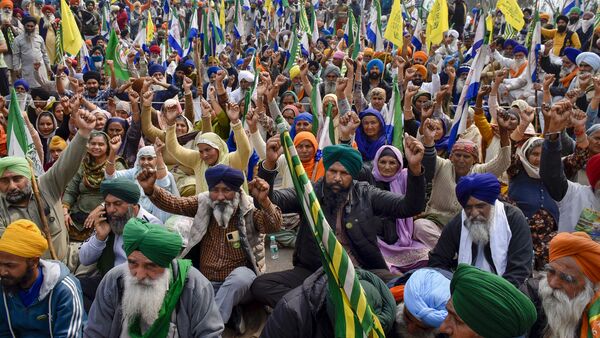The ongoing farmers’ protest in India, primarily against three contentious agricultural laws passed by the government, has been a significant point of contention and activism. The Samyukta Kisan Morcha (SKM), a coalition of various farmers’ unions, has played a pivotal role in organizing and leading the protests. Recently, the SKM announced its decision to integrate into the broader ‘Delhi Chalo’ agitation, which aims to escalate pressure on the government to repeal the contentious laws and address farmers’ concerns comprehensively.
This development underscores the unity and determination among farmers’ groups to intensify their agitation and amplify their demands. By merging with the ‘Delhi Chalo’ movement, the SKM aims to consolidate efforts and mobilize a larger force to challenge the government’s agricultural policies effectively.

SOURCE:- INDIA TODAY
The ‘Delhi Chalo’ agitation gained prominence as farmers from various states converged on the outskirts of Delhi to stage protests and demonstrations, demanding the repeal of the farm laws and the assurance of minimum support prices (MSP) for their produce. The movement garnered widespread attention and support, drawing participation from farmers across different regions and backgrounds.
SOURCE:- BBC NEWS
The decision of the SKM to join forces with the ‘Delhi Chalo’ agitation reflects a strategic shift in approach, emphasizing collective action and solidarity among farmers’ groups. By aligning their efforts, the SKM aims to strengthen the protest movement and sustain momentum until their demands are met.
The integration of the SKM into the ‘Delhi Chalo’ agitation is expected to inject new energy and vigor into the protests, with the potential to attract even broader support from civil society, political parties, and other stakeholders sympathetic to the farmers’ cause.
Furthermore, this development signals the evolving dynamics of the protest movement, characterized by adaptability and resilience in the face of challenges and setbacks. Despite facing obstacles such as government crackdowns, adverse weather conditions, and logistical constraints, the farmers have remained steadfast in their commitment to securing their rights and livelihoods.
The decision of the SKM also underscores the importance of sustained dialogue and coordination among various stakeholders involved in the protest movement. By uniting under a common banner, farmers’ unions can leverage their collective strength and bargaining power to push for meaningful reforms and policy changes.
the integration of the Samyukta Kisan Morcha into the ‘Delhi Chalo’ agitation marks a significant development in the ongoing farmers’ protest in India. It reflects the determination of farmers’ groups to escalate their agitation and intensify pressure on the government to address their grievances. As the protest movement continues to evolve, the unity and resilience of the farmers remain the driving force behind their struggle for justice and dignity.
Share your views in the comments

